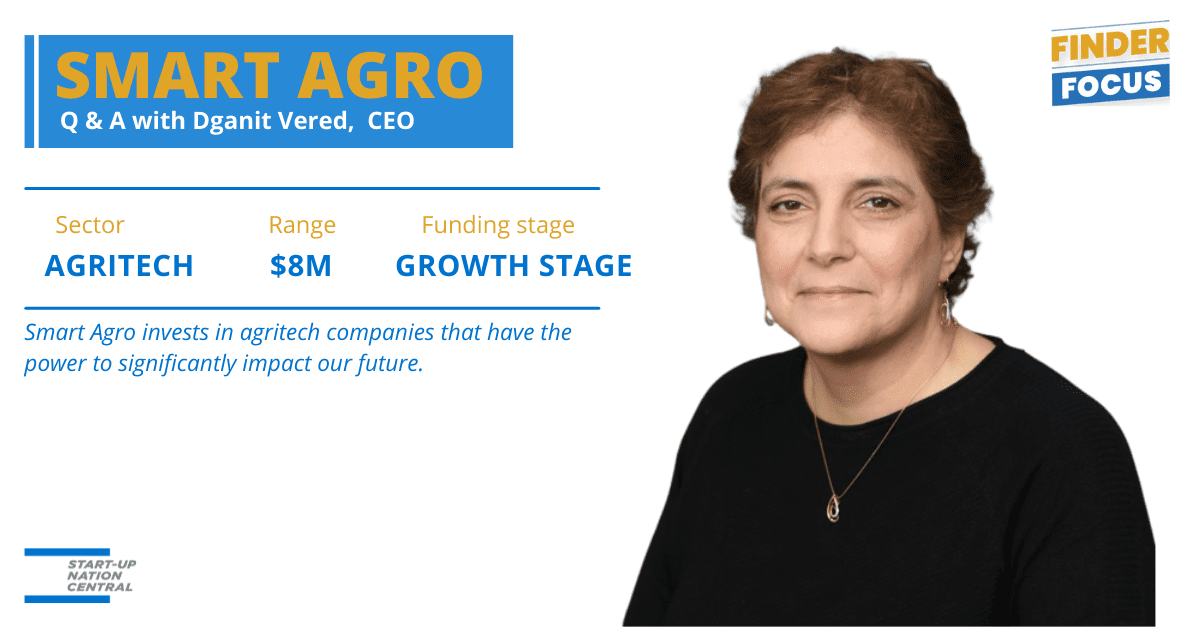
At the end of the day, I think about my kids. I’m afraid that my kids and future grandkids won’t have a place to live or food to eat.
Smart Agro invests in research and development companies that have the power to significantly impact our future and help transition them to independent, professionally managed companies that, at their core, have a unique technology with tremendous commercial promise and economic value.
Smart Agro’s highly experienced management team has an extensive business network that supports the development of ideas and startups from early-stage through mature companies to exit. Start-Up Nation Central sat down with Smart Agro’s CEO Dganit Vered to discuss the fund and its role in the future of farming and food.
Start-Up Nation Central: Tell us about Smart Agro and its overall mission.
Dganit Vered: Smart Agro enables people to invest in growing AgriTech startups in Israel. We strive to invest in companies that are making a difference in combating climate change issues and preserving the future of the planet. We are most interested in investing in those companies developing new techniques for food production and providing solutions for the other big problems in AgriTech.
Unlike venture capitalists, we look for less risky businesses to invest in to ensure the public’s invested funds are in good hands, so we want companies that have traction and a positive trajectory toward “unicorn” status.
Start-Up Nation Central: Tell us a bit about your background and how you found your way to the AgriTech sector?
Dganit: I worked for Intel for 17 years, where I learned most of my business skills related to management, strategy, and execution. When I left Intel, I took VP R&D positions, first at a pharmaceutical company and then at a seed company. Then I worked for companies in aquaculture and biopesticides before becoming a venture partner investing in AgriTech and FoodTech.
I traveled the world visiting facilities and meeting stakeholders and learning about the agriculture industry – falling in love with it really – but I quickly realized that the problems the industry faces are well beyond solvable with just seeds.
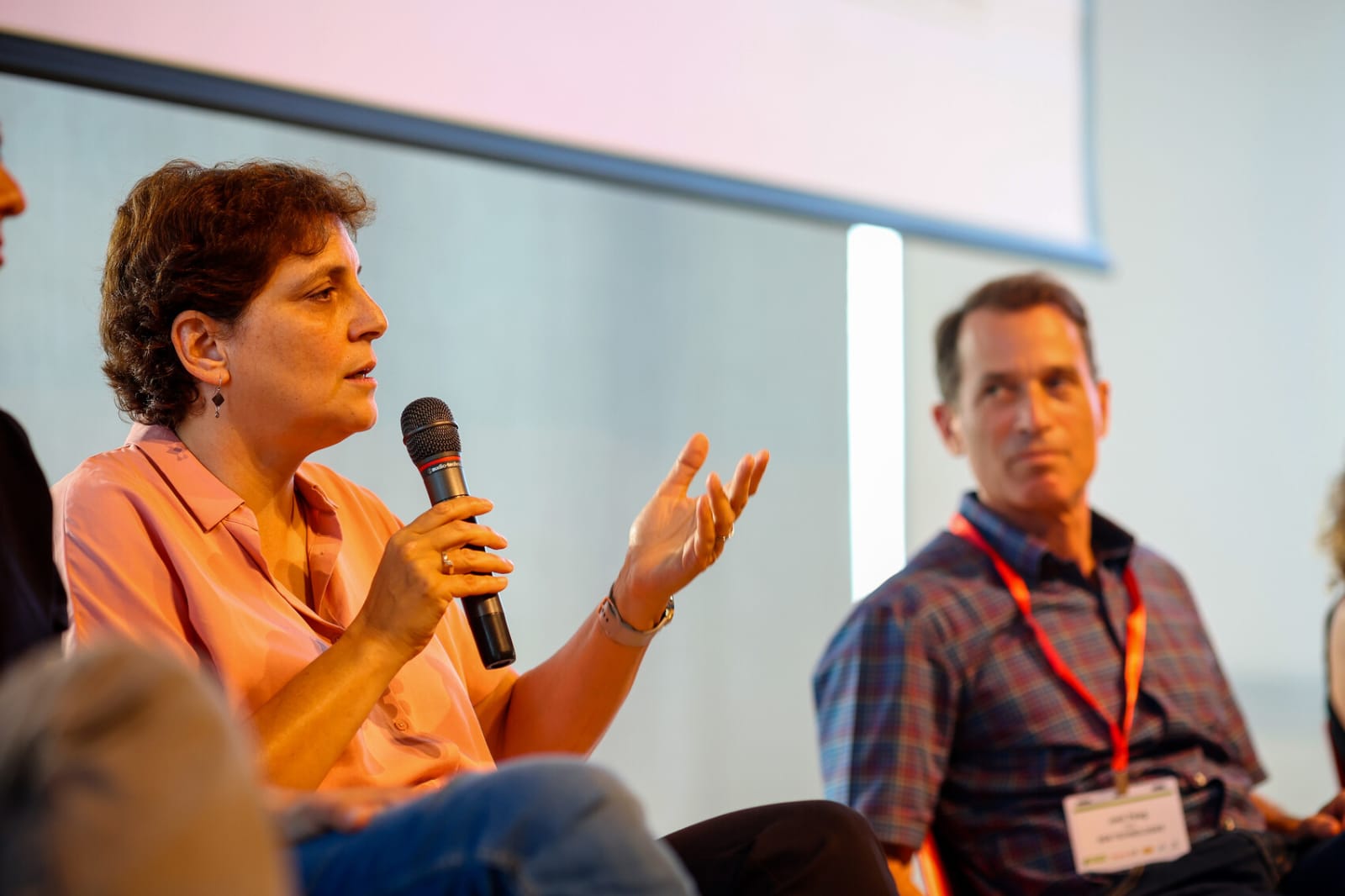
Start-Up Nation Central: What was your “Eureka” moment?
Dganit: It happened over time as I started to understand the inefficiencies in the industry. For example: how dependent we are on pollination, and that the pollination problem is much bigger than I thought. Around 40% of bee colonies die every year due to the results of climate change, and 70% of our food sources are dependent on pollination.
Start-Up Nation Central: Would you say that we are currently in a “save the world” situation?
Dganit: Definitely. As Nobel Prize winner Norman Borlaug said, “in the next 40 years, farmers will have to grow as much food as they have in the last 10,000 years combined.”
The reason I moved into entrepreneurship was to make better use of my brain power and make an impact with several companies in this space rather than one. I feel if we don’t act now and utilize technology to innovate new methods of food production, the world will have a huge problem to deal with in the future.
At the end of the day, I think about my kids. I’m afraid that my kids and future grandkids won’t have a place to live and food to eat. Because we are the startup nation, I don’t think we will save the world by reducing emissions but rather by using our brainpower to tackle the issues head-on, I’m been working in agritech investments for the past four years; and a year ago, I moved from Entrée Capital to Smart Agro – we now have six companies in our portfolio.
Start-Up Nation Central: Can you tell us about a few of these companies and why you invested in them?
Dganit: The companies we invested in are split by the areas of focus that we are involved in. Arugga built a robot that solves the pollination and headcount problem in greenhouses by using “air puff” technology – air does not transfer diseases like bees do while in contact with plants. The next model of this robot will replace human activity in the greenhouse
BetterSeeds are one of the leading 15 companies in the world specializing in CRISPR/Cas-9 gene editing for plants. These solutions enhance plant tolerance to external stresses. For instance, they breed cowpeas to replace soybeans because of their high tolerance to heat.
FruitSpec deals with size and yield prediction for orchards. They work to reduce the $30 billion yearly loss from food waste created by miscommunications between product marketing, packing houses, orchards farmers, and retail vendors. They created a dashboard to help orchards predict where and when to pick in order to generate as much revenue as possible, as well as give insight into what contracts to sign before the season starts.
“ In agritech specifically, Israeli entrepreneurs are more experienced than the rest.”
Start-Up Nation Central: What do you look for in a startup?
Dganit: The first thing we look at in a company is its team. We like to see if the team has the skills and capabilities to grow a company worldwide into a billion-dollar company. The chemistry between the team and their communication skills with investors are very important to us. We believe that investors are part of the team, and we work to improve the company alongside their existing team.
Start-Up Nation Central: How important is an entrepreneur’s passion when it comes to the AgriTech sector?
Dganit: Being a CEO of a startup is a very hard job; if the passion isn’t there, I would question how resilient they will be when the hardships of running a startup come to pass. There are always ups and downs that come with running a company, and they’ll have to be able to handle those pressures without burning out. That’s where passion comes in.
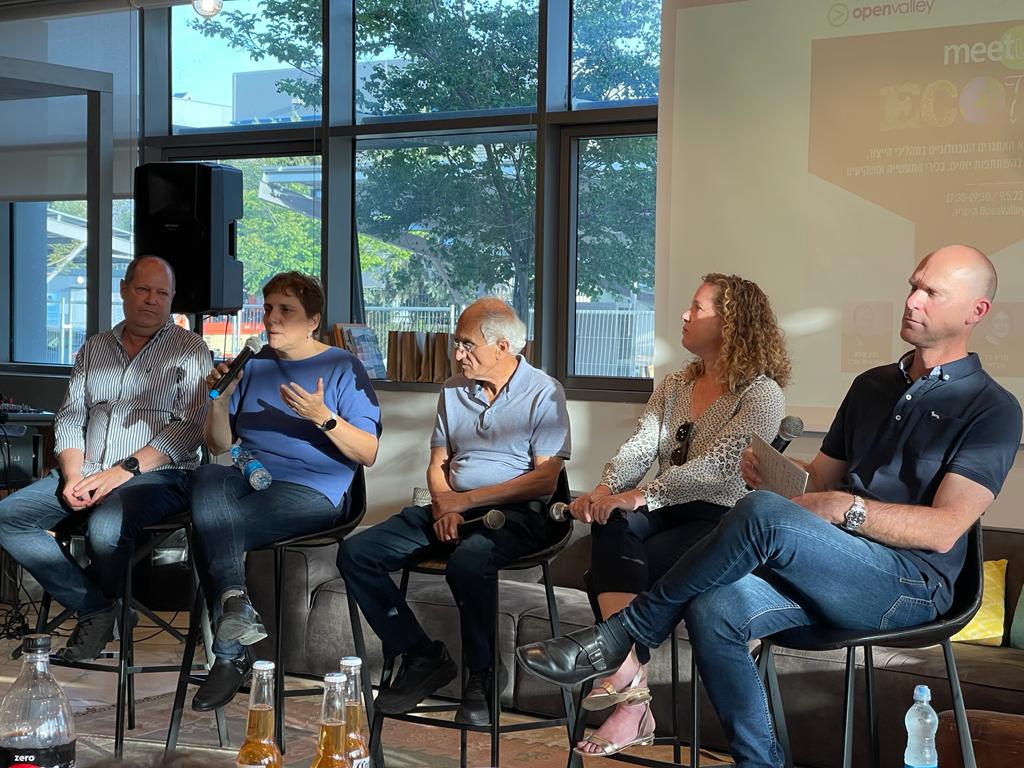
Dganit speaking at “DeserTech: The next frontier in climate technologies,” an event co-sponsored by Start-Up Nation Central and Desertech.
Start-Up Nation Central: Is there anything special about Israeli entrepreneurs?
Dganit: In AgriTech specifically, Israeli entrepreneurs are more experienced than the rest. Out of our six portfolio companies, only two are run by a younger person. Many of them come from different backgrounds and are already seasoned in the tech space. Their ability to learn on the go is what sets them apart from other entrepreneurs and other companies.
Start-Up Nation Central: How are the sectors of food and agriculture adopting innovation to address their challenges?
Dganit: First of all, food and agriculture are two very different problems. While some people may say they can’t live without ketchup, the truth is that ketchup is a luxury, while tomatoes are a necessary staple. When talking about food shortages versus agricultural problems, they don’t necessarily have the same impact and connection to each other as one may think. Currently, there is less attention on agricultural efficiency and more of a focus on replacing livestock and aquaculture. I believe that is because agriculture is difficult, has small margins, and takes longer time: you need to account for seasons, whereas with processed food, you can experiment all year round.
Start-Up Nation Central: What does success look like to you, and when will you feel like you’ve made it?
Dganit: We make it when the companies we’ve invested in make an exit. I believe for our portfolio companies, that will happen in the next 2-4 years. Usually, venture capitalists expect their companies to exit within 10 years, while we look to achieve this in a much shorter time frame. When a merger or acquisition of a company takes place, that is proof that that company has something valuable. An IPO is another exit path that is valid for our companies.
Start-Up Nation Central: What kinds of startups would you like to reach out to you?
Dganit: We are open to speaking with any startups that have to do with AgriTech. At times these startups will be too early or too late for us, but even so, I would be open to meeting with them to share tips or advice. If they’re too early, we would like to keep in touch till they reach the right stage. Those in the later stages, I most likely know about already because we screen for these companies using Start-Up Nation Finder regularly – it’s a useful tool that helps companies and venture capitalists connect.
“ Israelis always think about how they’re going to make themselves global. Most American or European entrepreneurs mainly think about becoming successful locally. That’s one of the things that sets us apart.”
Start-Up Nation Central: Besides Finder, how Start-Up Nation Central helped you?
Dganit: I love Start-Up Nation Central. It is one of the best NGOs at promoting the Israeli ecosystem abroad and pushing it in the right direction. A few weeks ago, I was at their event in Morocco, and the business connections I made there were invaluable. New relationships like that are essential for me and for any company looking to expand its reach. Two of our portfolio companies that joined the SNC delegation to Morroco were able to close deals during the visit. This is an incredible achievement.
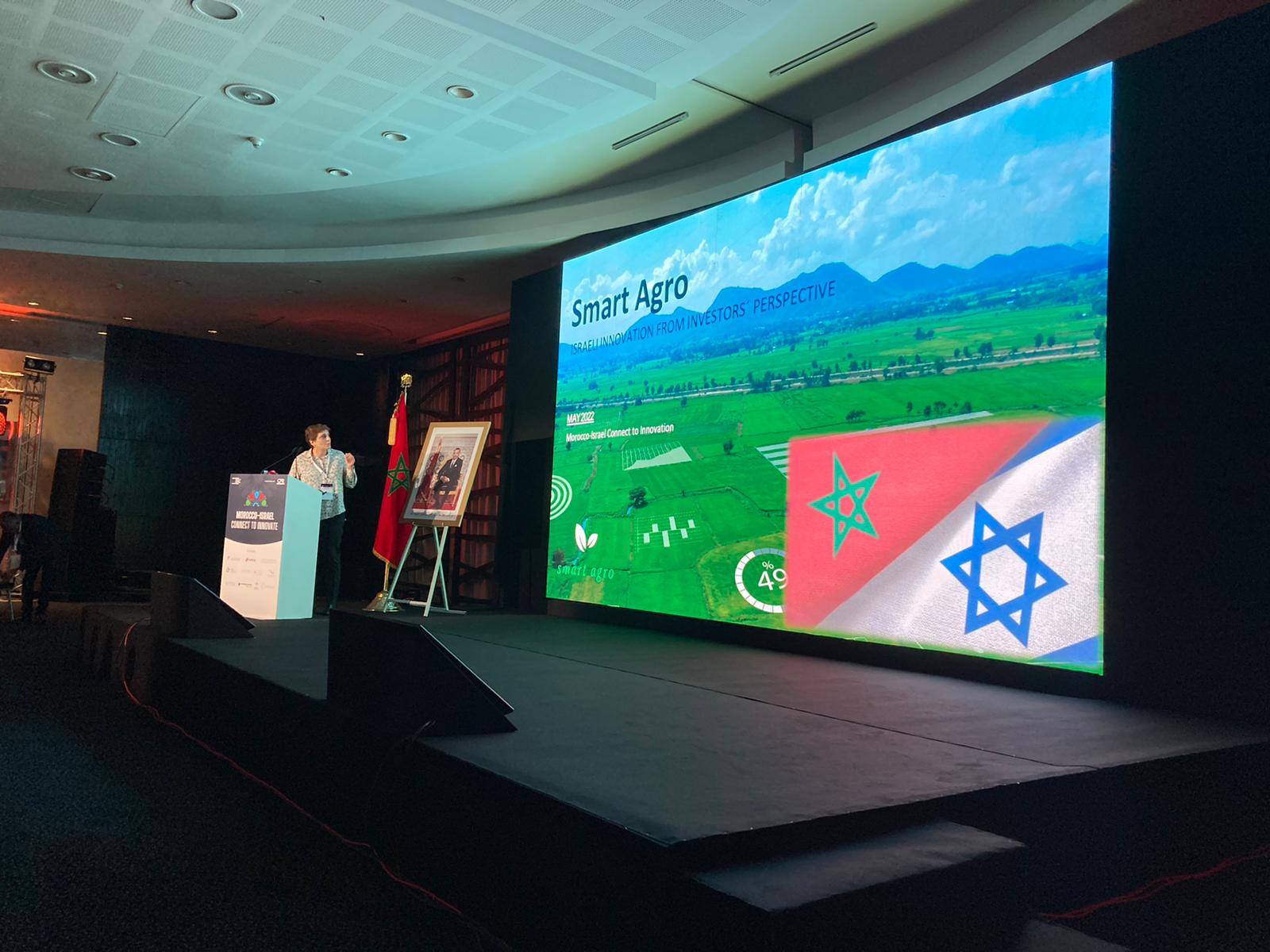
Start-Up Nation Central: What do you think investors and corporate executives around the world should know about Israel?
Dganit: I think they don’t always realize how strong the ecosystem is and how easy it is to work with Israeli entrepreneurs. Israelis always think about how they’re going to make themselves global. Most American or European entrepreneurs mainly think about becoming successful locally. That’s one of the things that sets us apart. Most of the Israeli population goes through army service and learns very important skills about managing people and resources very early; at 19, I was in charge of 60 soldiers at an age when many other future entrepreneurs were starting college.
Start-Up Nation Central: Can you recommend to our global audience a fun activity or favorite restaurant for when they come to Israel?
Dganit: A cold beer on the Tel Aviv beach with a view of Jaffa is an experience second to none.
Click here to learn more about Smart Agro on Start-Up Nation Finder.
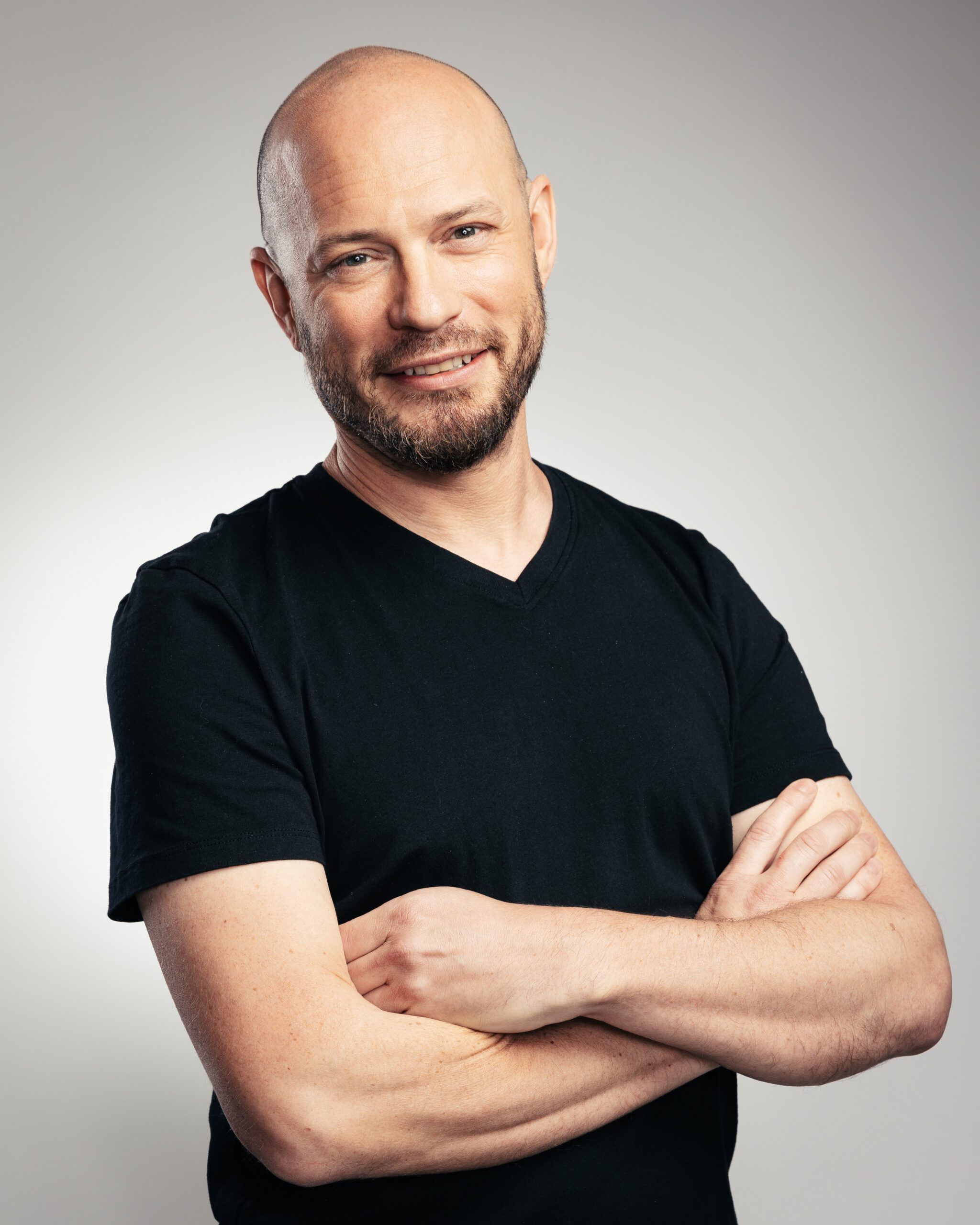
Phillip Stark is the Marketing Manager for Start-Up Nation Finder at Start-Up Nation Central. Finder is provided courtesy of Start-Up Nation Central, a non-profit organization that strengthens Israel’s innovation ecosystem and connects it to global challenges and stakeholders.
